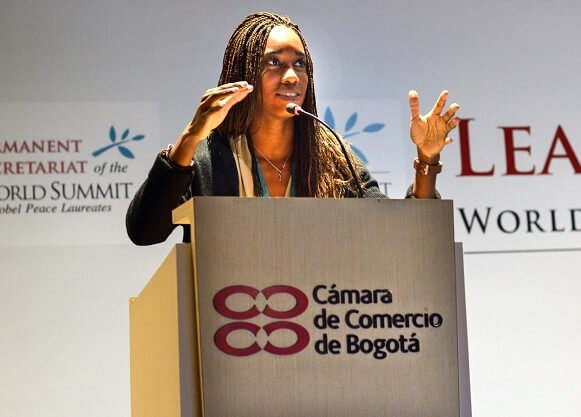
Students attend World Summit of Nobel Peace Laureates in Colombia
March 01, 2017

March 01, 2017

Colombia President Juan Manuel Santos, who received the Nobel Peace Prize last year for his work drawing up the country’s recent peace accord, spoke at the early February event that was attended by many previous Nobel Laureates. The University delegation traveled with staff from the Albert Schweitzer Institute at Quinnipiac.
The accord ended the 50-year civil war between the Colombian government and the militant leftist group, FARC. Santos’ efforts drew praise from both government supporters and former FARC members at the summit.
“There was a real sense of hope for the future among the people gathered there, especially the youth,” said political science major Danielle Tomlinson ‘17, who recruited and selected the students for the trip and presented informational workshops to prepare them. She also wrote and delivered this year’s youth declaration, a statement summarizing what changes each delegation present would like to see in the world. Tomlinson said her declaration addressed such topics as the end of the arms race, inclusive education and social justice for all.
Colombia’s historic peace treaty was especially significant for one of the students in Tomlinson’s group –– marketing major Jeffrey Paz-Lerma ‘19, whose parents are Colombian.
“The peace accord will directly affect the members of our family still living in Colombia. It meant a lot for me to be a part of this summit,” Paz-Lerma explained.
Paz-Lerma and his fellow students had the opportunity to network with college students from around the world, as well as with representatives from several impactful nongovernment organizations. They also took part in workshops hosted by past Nobel Laureates, including Shirin Ebadi, who earned the award in 2003 for championing human rights and democracy in Iran, where she became the first female judge; and Leymah Gbowee, who earned the prize in 2011 for leading the women’s peace movement that brought an end to the second Liberian civil war. Both women visited Quinnipiac last fall along with Yemeni journalist and human rights activist Tawakkol Karman, who shared the 2011 prize with Gbowee.
“One of the most important messages I took away from the summit was that to move the world, you must first move yourself,” said Paige-Ashley Campbell ‘17. “This really inspired me to be more active in my community back in the United States concerning the causes I am very passionate about — such as access to health care.”
Quinnipiac faculty members conducted workshops on such topics as the peace treaty in Northern Ireland, human rights, forgiveness, Earth University and sustainability, and the aftermath of the Colombian treaty.
David Ives, executive director of the Albert Schweitzer Institute, has been bringing Quinnipiac delegations to the summit for the past seven years. The summit reinforces the University’s mission of exposing students to international experiences to inspire them to actively participate in the affairs of the world.
“Students here have the opportunity to work with important people who are actively addressing real-world problems,” said Ives. He remarked that “words without action are just words.”
Tomlinson took that message to heart. She was determined to take more away from the summit than idealistic discussion and made a point of seeking out several high-profile figures, including the U.N. ambassador to Jamaica, and the executive director of the Desmond Tutu Foundation.
“It’s not enough for me that we simply come here, have these powerful conversations, and then just leave,” Tomlinson noted. This was her fourth summit –– last year’s was in Barcelona.
She said she especially enjoyed her conversation with philanthropist and business magnate Sir Richard Branson, who was honored with this year’s Peace Summit Award for his significant contributions to peace building and human rights.
“I knew I could not leave without saying something to him,” said Tomlinson. “I was absolutely determined.”
The pair discussed public health and education issues, particularly ways to disrupt the school-to-prison pipeline in at-risk communities. Branson, founder of the Virgin Group, was so impressed with Tomlinson’s passion and commitment to action that he invited her to connect with Virgin Unite, a nonprofit that funds entrepreneurial solutions to global issues. Tomlinson’s goal is to help facilitate a partnership between Virgin Unite and the Albert Schweitzer Institute.
Tomlinson, who plans a career in international advocacy, also impressed several of the Nobel Laureates, particularly Leymah Gbowee, who told Tomlinson she possesses “the right ingredients” to be a world leader.
“She also said she’d always remember my face among the many at the summit. That meant a great deal to me,” she said.
Quinnipiac Today is your source for what's happening throughout #BobcatNation. Sign up for our weekly email newsletter to be among the first to know about news, events and members of our Bobcat family who are making a positive difference in our world.
Sign Up Now